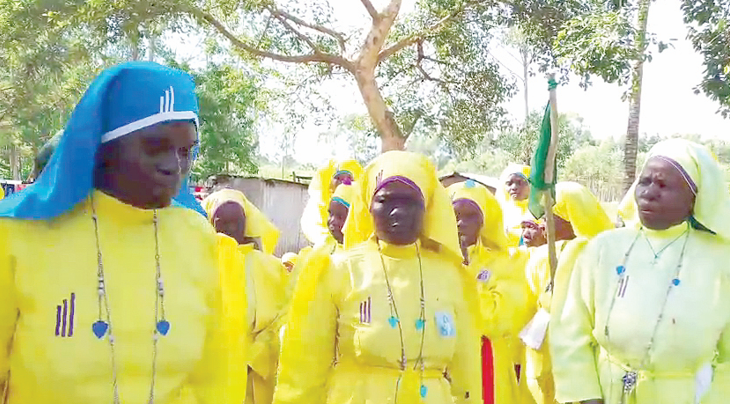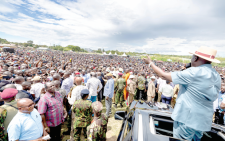Two found dead in doomsday like saga

Two people were found dead while 57 other frail congregants were rescued from a church in East Kamagambo, Rongo in Migori County on Monday night.
The bizarre incident took place at St Joseph Missions of Messiah Church in Kanyadiedo Sub-Location.
It is at the same church where another follower, General Service Unit (GSU) officer Dan Ayoo Obura, died on March 27 after he refused to seek medical attention. Obura was later buried within the church.
The latest incident is a classic case of exploitation of congregants’ vulnerability.
The rescued congregants rejected treatment when they were taken to a local hospital by detectives from the Rongo Directorate of Criminal Investigations (DCI).
The detectives were informed on Monday that there was a body at the church. They found the body, which was later identified as that of Francis Muli, lying on the floor in a prayer room within the church.
Women and girls
The body was covered in a white robe and wrapped in a grey sheet. It bore injuries on the face, and foam was oozing from the mouth.
Earlier in the day, another body was recovered from the same place, police said.
After the discovery, police conducted a search and found 57 people residing within the church.
The frail congregants were escorted to Rongo Sub-County hospital for medical attention but they refused to be examined.
Most of the rescued persons were women and girls, with the oldest being Clarice Were, 77. Others were James and Elizabeth Odhiambo, aged 75 and 55, respectively.
Curiously, some of them, especially the young ones, had been named “Haleluhya”.
They began to make noises and sing religious songs.
When they persisted, the medical officers advised that the group be removed from the hospital since they were disturbing other patients.
Police said they were taken to the station to await further directives.
Locals say the church gates are usually locked and have a high perimeter wall that no one can see what is happening inside the compound.
“We know very little about what goes on inside the church. It is strange that the authorities are aware of its existence but have done very little,” a local resident said.
Another detective said, “They were under control, and they had no food, no access to the outside world. Some hadn’t spoken to their families in months.”
This is the second known such incident to happen in the area amid a probe into claims of occultism. On March 27, a police officer was buried within the church under mysterious circumstances.
His wife, Lilian Olal, claimed that he had been ailing and was heading to the church to seek prayers when he passed away.
Obura was based at the GSU headquarters in Nairobi.
Some of his family members told police they had complained about the church in the past, arguing their son had been radicalised.
A recent study by the National Crime Research Centre (NCRC) has revealed that some religious groups are involved in abuses of human rights, murder and unusual killings, incitement of members to kill the elderly, seizures or persuading of members to sell their properties and surrender to the religious leaders.
NCRC says there is need to strengthen law enforcement efforts to investigate and prosecute criminal activities while respecting religious freedoms and promoting dialogue.
It has further revealed that there were alarming practices by the religious groups studied, including dietary restrictions, ritualistic animal slaughter, stringent access controls to their religious spaces, and a general aversion to conventional medical treatment.
“Some groups also maintain a high level of secrecy surrounding their activities, limiting members’ access and participation in elections or other government-led public campaigns,” the NCRC report states.
Vulnerable members
The report raises concerns about misinterpretations, which could eventually lead to radicalisation.
“The composition of religious group’s members revealed a pattern of exploitation of vulnerable members of the society, with a characteristic high women membership, who are playing crucial roles in various capacities within these religious narratives,” it adds.
The study also highlighted a lack of theological training among leaders, leading to the misguiding of followers. Manipulation of congregants through fear, especially in relation to end-time teachings, were evident.
There were personal consequences for leaving these religious groups, with exits being viewed as betrayals and a fear of risks for exposing the secretive practices.











